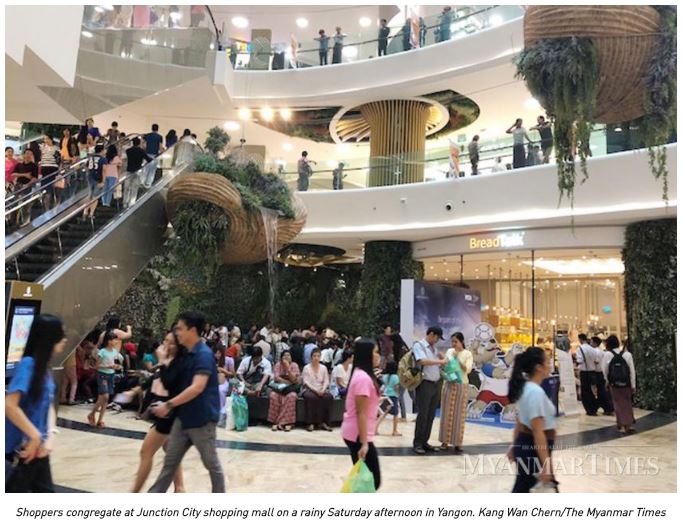Lack of retail offerings in Myanmar yields growth opportunities for investors
Demand for retail space has been on the rise in Yangon, where the population has swelled and living standards are improving. Earlier this year, the government also permitted foreign ownership of local wholesalers and retailers and last month allowed businesses in the sector to trade in a total of 24 products.
Ko Nay Min Thu, managing director of imyanmarhouse.com, told The Myanmar Times that the retail market in Myanmar yields better opportunities for growth compared to neighbouring countries. This is because there are still few shopping malls in relation to the number of people.
“Shopping malls with recreational areas have become popular in Singapore, Thailand and Malaysia. When Myanmar people visit these countries, they have fun in these shopping malls so there is potential to develop similar retail offerings in Myanmar,” he said.
The retail sector can be broken down into shopping malls, hypermarkets, supermarkets, department stores and supporting retail outlets such as standalone stores or shops in condominium buildings, for example.
There are currently just a handful of shopping malls in Yangon, including Junction City, Myanmar Plaza, Junction Square and City Mall St John. Meanwhile, the majority of the city’s supermarkets are run by City Mart Holdings.
As such, there is huge untapped potential and demand for retail areas of 50,000 sqm and above, according to Colliers International Myanmar. Lifestyle shopping malls are the trend in regional cities like Bangkok, Manila and Jakarta. In Yangon though, this is an untapped space that can create jobs and spur the economy if developed.
Karlo Adrian Pobre, deputy managing director of Colliers International Myanmar, said: “Yangon gets really wet during the rainy season and it gets hot in summer. As living standards improve, shopping malls will be the new public parks going forward. There are opportunities for developers to build modern malls with space of recreation and activities.”
That has already piqued the interest of international investors keep to capture more growth including mall operators like Japan’s Aeon and supermarket chains from Thailand which are reportedly seeking out growth opportunities in Myanmar.
Better offices
There are other bright spots in the property market, such in the office space. While demand for international-standard offices is on the rise, supply of such units is still insufficient, Mr Pobre said.
In Yangon, there are around 300 000 sqm-400 000sq m of office space but this is still very little compared to other cities. In Vietnam’s Ho Chi Minh and Hanoi, for example, there is almost 1.5million sq m of office space. In Bangkok and Manila, total international standard office space is up to 6 million sq m.
Softer condo, hotel demand
Importantly, this is coming at a time when demand has been weak for other types of existing property in Yangon. There is currently a glut in five-star hotel rooms and high-end serviced apartments, while demand for existing condominiums has trickled dry.
In the condominium market for example, the majority of existing supply consists of three bedroom and two bedroom units, which are beyond the means of most. “Affordability is an issue. If we look at the price per square meter of around US$2,500, it is pretty much the same as in Bangkok or Jakarta. The problem is the sizes of the units in Yangon are too big,” Mr Pobre said.
“In Yangon, condo units are big because of the council’s regulations. The Yangon City Development Committee (YCDC) allows one parking space for every 1.2 units. If the YCDC can change this rule, there would be better opportunities to build smaller and more affordable units, which would spur more demand,” he added.
While demand for top-end hotels and serviced apartments has tapered, Colliers International Myanmar points out there are opportunities in the mid-tier space. For example, most of the serviced apartment such as Micasa Marina, Lotte Serviced Apartments and Shangri-La Serviced Apartments are fully furnished and equipped with facilities. But there is untapped potential to meet demand for mid-tier, no frills serviced apartments.
“There is very limited supply of mid-tier serviced apartments in Yangon as most existing ones are expensive by regional comparison” Mr Pobre said.
Source: https://www.mmtimes.com/news/lack-retail-offerings-myanmar-yields-growth-opportunities-investors.html


 English
English




